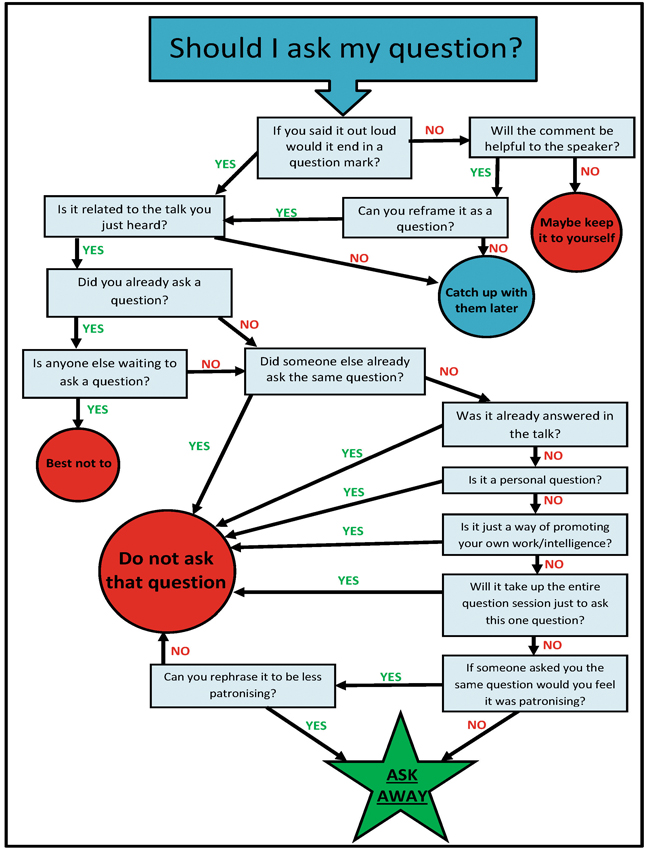Surviving the question session
Picture this: You are at a conference; you have come to the end of your talk and turned to the audience. “Any questions?” you ask. Hands go up, and an audience member is chosen. They proceed to ask a question completely unrelated to your talk. Potentially, they are quite rude. Or maybe they launch into a monologue that isn’t actually a question.
Most people who have attended conferences either have found themselves in this situation or have seen it happen to others (and inevitably cringed). We have gathered together the advice of hundreds of scientists on how to (a) avoid asking those awkward questions and (b) respond to them when you find yourself on the receiving end.
Interaction guidelines
We came up with a list of ways to interact and give feedback at a conference that will ensure a positive experience for everyone:
- Be polite at all times.
- Offer constructive advice and help.
- Listen carefully to the person speaking, and base your question on the content of the talk.
- Ask politely for references or figures. If the speaker doesn’t have these at hand, speak to them later at the conference to discuss and exchange details.
- Ask concise questions, and feel free to follow up with presenters after the talk for further details about their presentation and wider information on the work they do.
- Approach a presenter over coffee/tea or at evening receptions to discuss their work in more detail and any conflicting literature you may have read. This is a great way to network and build collaborations.
- Compliment people on their presentations and give constructive criticism, or ask if they have considered certain literature or methodologies.
- Make allowances for the career stage of the speaker — go a bit easier on master’s students than you would on a professor.
- Speak clearly, slowly and loudly, and be patient if you need to repeat the question. Odds are if the speaker didn’t understand, others in the room will also benefit from you repeating the question.
What if someone still asks an awkward question?
Inevitably, not everyone will have read this article or have good conference etiquette. Unfortunately, you are likely to find yourself having to deal with these kinds of questions (or nonquestions) at some point. How you deal with a question depends on the nature of the question asked.
In the case of a rude or irrelevant question, you can always do your best to answer; however, one of the easiest ways to deal with this is to defer answering and invite the audience member to catch up with you during the break. Sometimes it can be easier to deal with these issues in a smaller group setting than in front of an audience. If someone is asking a very long question or has launched into a monologue, cutting them off with “Do you have a question?” is perfectly acceptable. If you don’t feel comfortable interrupting them, then allowing them to finish before responding, “Interesting point!” is a good way of moving the discussion along. Ultimately, it depends on you and what you feel comfortable doing. Don’t feel you have to ask them to join you over coffee if the last thing you want to do is speak to them further. (If it’s a big enough conference, you can always avoid them.)
Ultimately, however, it should be up to the session chair to prevent and shut down inappropriate questions during a conference session. In our discussions with other scientists, we found that many people, particularly early-career researchers, stressed that they may feel uncomfortable calling out or even interrupting inappropriate questions — especially if the questioner is senior to them. Guidelines given to all conference attendees on what is expected of session chairs would help chairs do their job effectively as well as helping improve question sessions in general.
Overall, while there are certainly nuances around the points raised here, if conferences provided guidelines along these lines for chairs, speakers and attendees, it would result in a much more constructive, positive conference environment for everyone involved.
This article was adapted from a series of blogs published by Dani Rabaiotti (@DaniRabaiotti) and Jeff Clements (@biolumJEFFence) resulting from conversations they had on Twitter.
 Should I ask? Based on the feedback of many conference attendees, this diagram addresses whether it’s a good idea to ask that burning question you have during a post-talk question session.image courtesy of Dani Rabaiotti
Should I ask? Based on the feedback of many conference attendees, this diagram addresses whether it’s a good idea to ask that burning question you have during a post-talk question session.image courtesy of Dani Rabaiotti
Enjoy reading ASBMB Today?
Become a member to receive the print edition four times a year and the digital edition weekly.
Learn moreFeatured jobs
from the ASBMB career center
Get the latest from ASBMB Today
Enter your email address, and we’ll send you a weekly email with recent articles, interviews and more.
Latest in Careers
Careers highlights or most popular articles

Becoming a scientific honey bee
At the World Science Forum, a speaker’s call for scientists to go out and “make honey” felt like the answer to a question Katy Brewer had been considering for a long time.

Making career resolutions a reality
Planning your next year (or 10) can include backward planning, exploratory goals and more

Upcoming opportunities
Register for ASBMB's Feb. 6 webinar on perceptions of science and public engagement.

I find beauty in telling stories about giants
Andrea Lius wished she could find a focus for her scientific research — until she realized that what she really liked was talking to other scientists about the focus of their work.

Upcoming opportunities
Feb. deadlines: Register for ASBMB's meeting on ferroptosis by Feb. 18 to save $50. Plus, book a recruiter table at the #ASBMB25 career and education fair by Feb. 15.

New year, new goals: Advice for grad students
Fourth-year Ph.D. candidate Matt Selby talks to careers columnist Courtney Chandler about his personal goal of publishing a first-author journal article and the importance of time management.


